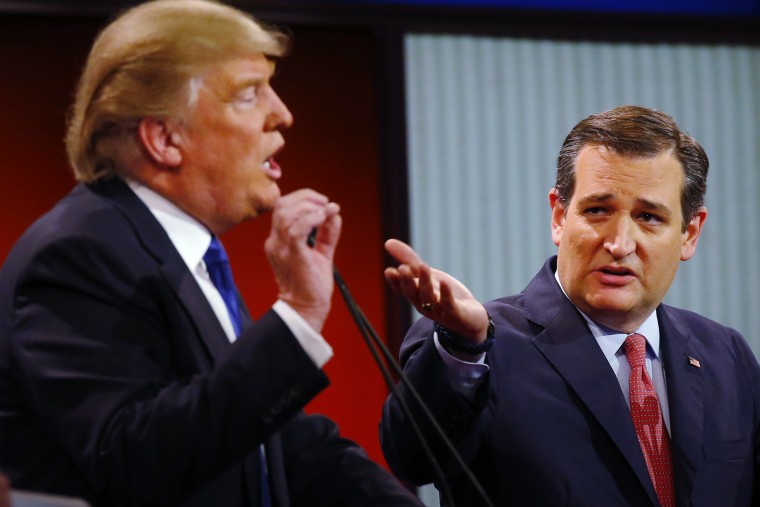For months, one of the few constants in the race for the Republican presidential nomination has been the race to be the anti-Trump -- Donald Trump has dominated for nearly the entire process, and his GOP rivals have fought tooth and nail to be his principal rival.
As of last night, the race to be "the other guy" appears to be effectively over.
In the Republican race, Texas Sen. Ted Cruz claimed the first two victories of the night, winning in Kansas and Maine, while Donald Trump finished second in both. Cruz was the runner-up in close races that Trump won later in the evening in the Louisiana primary and Kentucky caucus. Marco Rubio and John Kasich finished well behind the two winners in today's contests.
Heading into the weekend's races, polling was scarce, making it harder to set expectations, but by any measure, Cruz had an excellent night, dominating in Kansas -- where the party establishment rallied behind Rubio -- and posting a double-digit win in Maine, the Texan's first victory in the Northeast.
Trump won in Louisiana and Kentucky, though by slim margins over the second-place Cruz.
There were lingering questions about the kind of lessons to be learned by Super Saturday. If Cruz won a race or two, would it be because of those state's unique constituencies -- Mike Huckabee and Rick Santorum also won their races in 2008 and 2012, respectively, even as a dominant frontrunner emerged -- or because of his genuine strength relative to Trump?
With easy two victories and two narrow second-place finishes, I'm inclined to give Cruz quite a bit of credit (this is especially true in Louisiana, where he narrowed the gap at the very end). Cruz's candidacy appears to be growing genuinely stronger at a key phase in the race, even as his rivals grow weaker. The Texas senator wanted to create a two-man race and as of last night, that's exactly what he appears to have done.
Oddly enough, that's not necessarily bad news for Trump. In fact, it may move Trump closer to his goal.
Given Trump's current advantage, both in wins and delegates, there's really only one scenario he has to worry about, at least in the short term: the emergence of one strong rival with broad support, whom the anti-Trump contingents would rally behind.
In theory, Cruz could be that candidate, but in practice, much of the Republican establishment hates Cruz nearly as much as it hates Trump. The GOP's anti-Trump factions could go all in on Cruz, but they simply don't want to -- when these party insiders said, "Anyone but Trump," their pleas came with fine print that added, "Except Cruz, whom we also hate."
Slate's Isaac Chotiner joked, "If the choice is between these two men, it's possible that #NeverTrump becomes #WhoCaresWe'reScrewedNoMatterWhat."
Stepping back, let's again try to cut through the noise and break things down from a pitch-vs-hype-vs-truth perspective.
Donald Trump
The Pitch: I've still won 12 of 19; I still enjoy a big delegate lead; and I'm still the frontrunner.
The Buzz: Two losses and two wins make Trump appear vulnerable for the first time since Iowa.
The Truth: Actually, they're both right. It'll take more than these Super Saturday results to derail Trump, but yesterday's contests hardly suggest he's getting stronger as the race moves forward. It's hard not to get the impression that his recent antics, coupled with more aggressive attacks on his candidacy, have taken a real toll.
Ted Cruz
The Pitch: Six wins -- including five this week -- validate all of the "two-man race" rhetoric.
The Buzz: Nice job becoming the #2 candidate in the Republican field, but the map doesn't look especially favorable in the weeks ahead, and party leaders still hate you.
The Truth: Actually, they're both right on this, too. If Cruz was in a position to use these results to create a more favorable landscape -- forcing rivals out, coalescing anti-Trump support, etc. -- he'd have far more reason to be optimistic, but that's not the case.
Marco Rubio
The Pitch: Clear skies ahead! We're right on track! Wait, where are you going? Come back so I can tell you all about my many endorsements that apparently have no meaning!
The Buzz: You had every possible advantage, and you've nevertheless lost 18 out of 19, and most of the defeats have been by surprisingly wide margins.
The Truth: The scale of Rubio's losses is hard to overstate. He lost by 20 points in Kentucky, and of yesterday's four races, that was the race in which he was the most competitive. Rubio finished fourth in Maine where he failed to meet a low delegate-eligible threshold; he failed to reach 20% support in any state; and he lost by 31 point in Kansas -- where he actually tried to win, and where he had the overwhelming back of the party establishment. Super Saturday was more than a setback for Rubio; it was a complete catastrophe.
John Kasich
The Pitch: We beat Rubio in Maine!
The Buzz: The good news is, it's a four-man race. The bad news is, you're #4.
The Truth: Kasich is under the impression that he can simply tread water until the Ohio primary next week. But even if wins his home state -- it would be his first and only victory to date -- it's not at all clear how Kasich intends to parlay that win into anything tangible. The governor has put together some respectable second-place finishes in recent weeks, but unless he can convince Rubio to quit, this race clearly isn't going his way.
